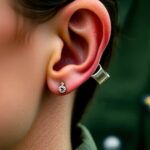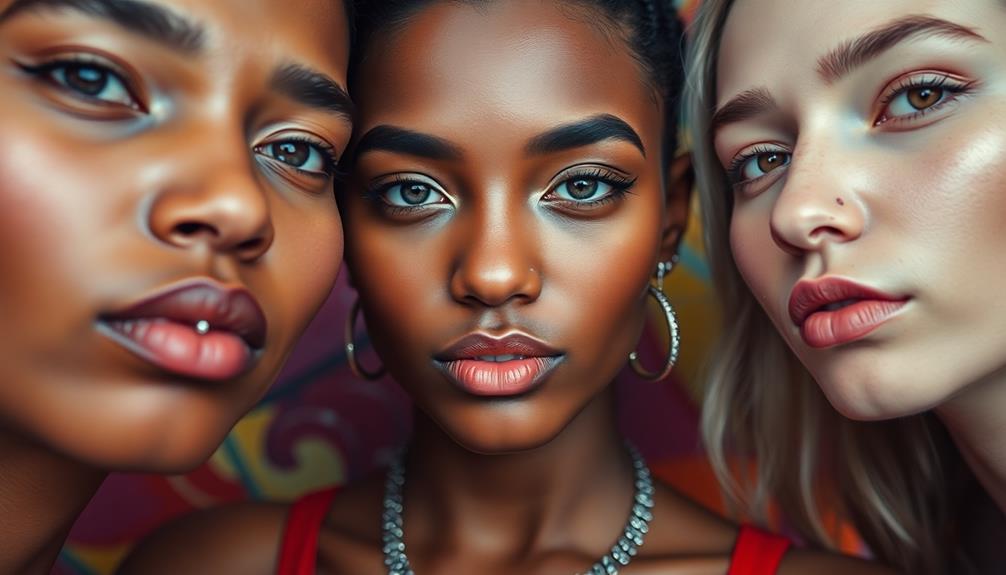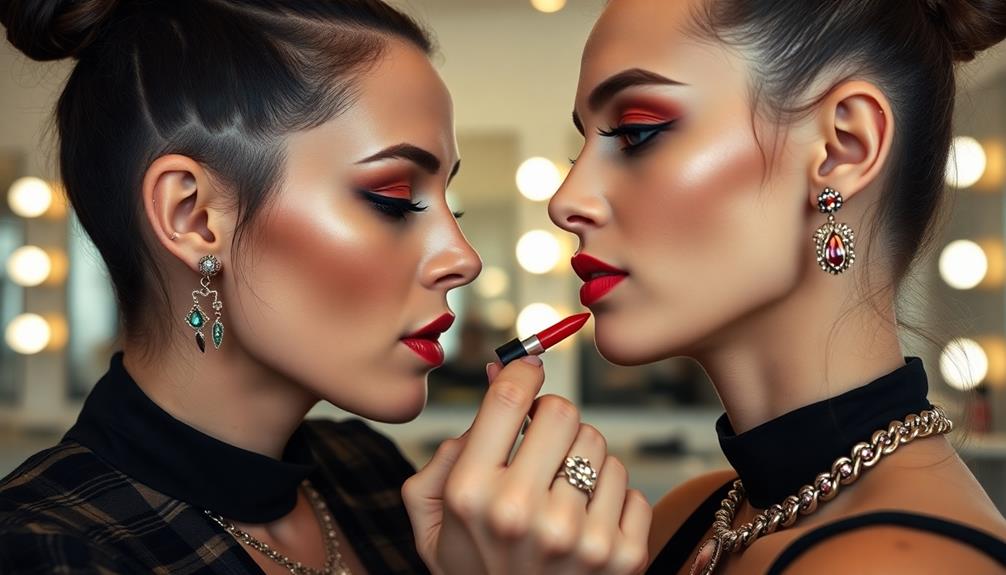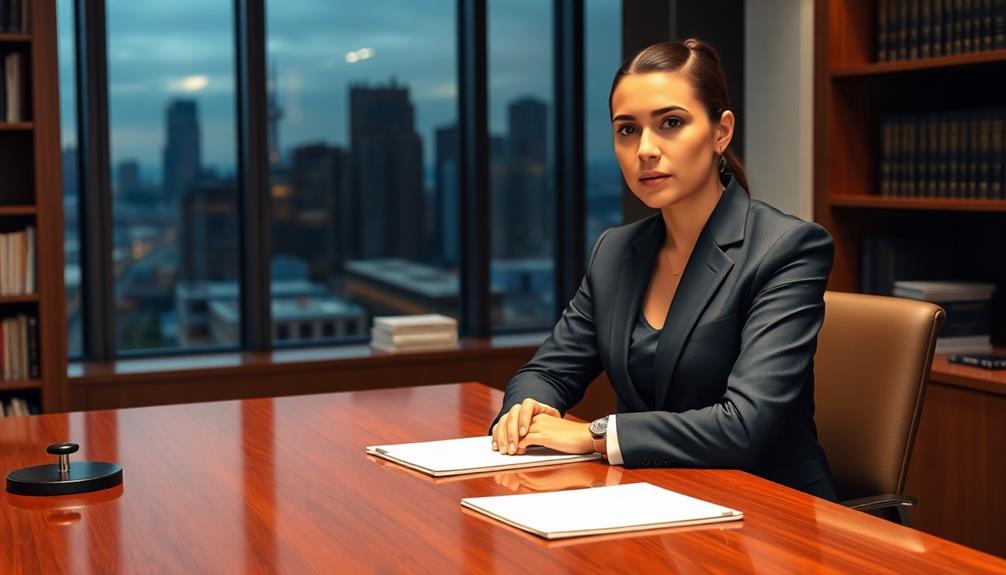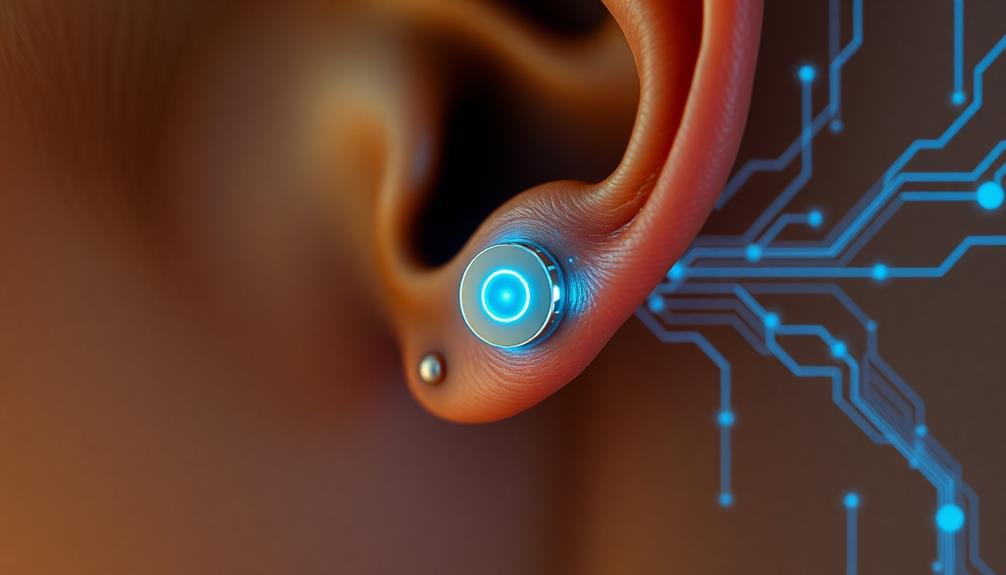In healthcare, rules about piercings can vary, but professionalism is key. Many hospitals and clinics have strict policies, often limiting jewelry to small, discreet earrings while prohibiting facial piercings. This helps maintain a neutral appearance that comforts patients. You'll want to check your facility's specific regulations; some might allow small nose studs, while others require all piercings to be removed during shifts. Remember, patient perceptions can greatly impact your career opportunities, so understanding these guidelines is essential. If you want to know more about specific rules and best practices, there's plenty more to explore on this topic.
Key Takeaways
- Nursing schools often enforce strict dress codes, limiting visible piercings to maintain professionalism during clinical training.
- Workplace policies on piercings vary widely; some facilities ban all facial jewelry while others allow small, discreet options.
- Compliance with piercing regulations is crucial for maintaining patient trust and professional appearance in healthcare settings.
- Patients typically prefer healthcare professionals without visible piercings, associating them with professionalism and hygiene.
- Discreet jewelry options, like small studs or clear retainers, can allow for personal expression while adhering to healthcare dress codes.
Nursing School Standards

Nursing school standards often impose strict dress codes that can clash with students' self-expression. You might find that these dress codes prohibit visible piercings, aiming to maintain a professional appearance during your practicum.
Institutions like James Madison and Johns Hopkins have specific policies that limit facial jewelry, allowing only small earrings in clinical areas. Similarly, UCLA Nursing School restricts jewelry to wedding bands, watches, and small earrings, emphasizing a neutral appearance that aligns with professional expectations.
As a nursing student, you face the challenge of balancing your desire for self-expression through piercings with the professionalism required in healthcare settings. The academic pressures can make this balance even more complicated. You might feel the need to conform to these standards, which can sometimes feel stifling.
Resources like NURSING.com offer visual lessons and support, guiding you through the complexities of maintaining professionalism while maneuvering your personal style.
Understanding these nursing school standards is crucial, as they not only shape your appearance but also prepare you for the expectations you'll encounter in your future career. Embracing professionalism doesn't mean sacrificing who you are; it's about finding a way to express yourself within the boundaries set by your educational institution.
Workplace Policies on Piercings

When it comes to workplace policies on piercings in healthcare, you'll find a mix of regulations across different facilities.
Some places allow small, discreet jewelry, while others require you to remove all piercings during your shifts.
Understanding these policies is essential, as they impact your professionalism, patient perception, and overall safety in the clinical environment.
Facility-Specific Piercing Regulations
In healthcare, facility-specific piercing regulations can vary widely, impacting how professionals express themselves. Some healthcare systems, like Cleveland Clinic, prohibit all facial piercings, while others, such as Ascension Health, allow nose piercings, reflecting a growing acceptance of personal expression.
Meanwhile, Mission Health System enforces strict jewelry limitations, emphasizing safety and compliance with infection control guidelines. Understanding these policies can be as important as knowing about home security system costs, which may also affect your overall job satisfaction and personal life.
As a nurse, you need to be aware of your institution's specific policies. Many facilities require the removal of unhealed piercings during work hours to maintain a professional appearance. Indiana Health System takes a more lenient stance, permitting visible tattoos and piercings but expecting moderation in their appearance.
Understanding these facility-specific piercing regulations is vital for your nursing career. Not only do they affect your personal style, but they also play a role in ensuring patient safety and comfort.
Professionalism and Patient Perception
How do workplace policies on piercings influence patient perception in healthcare settings? The rules around piercings can shape how patients view your professionalism and competence. Some facilities allow small, discreet studs, while others, like the Cleveland Clinic, prohibit nose piercings altogether.
This inconsistency can send mixed messages to patients. Research shows that many patients associate visible piercings, especially facial ones, with lower levels of professionalism. This perception can greatly impact their overall satisfaction and trust in your abilities.
By adhering to workplace policies, you help maintain a neutral appearance that fosters comfort and trust among patients. Large or distracting piercings might divert attention from the care you're providing, which could hinder the patient experience.
Understanding your facility's guidelines is essential. Non-compliance can lead to disciplinary actions and limit your job opportunities in stricter environments.
Ultimately, being mindful of how your appearance, including piercings, aligns with professionalism can enhance patient perception and contribute to a more positive healthcare experience for everyone involved.
Compliance and Safety Standards
Workplace policies on piercings directly impact compliance and safety standards in healthcare settings. These policies can vary considerably, with some institutions allowing only small, discreet studs, while others require complete removal during work hours.
For example, the Cleveland Clinic prohibits all facial piercings, whereas Indiana Health System permits visible tattoos and moderate piercings. This inconsistency can create challenges for you as a healthcare professional. Understanding the importance of maintaining a professional appearance is essential, as recognizing narcissistic behaviors can also help in maneuvering workplace dynamics.
Maintaining a neutral appearance is often prioritized to uphold professionalism, as visible piercings can lead to negative patient perceptions about competence and hygiene. Safety protocols also come into play; unhealed piercings might need to be removed to avoid risks associated with snagging or injury during clinical duties.
Understanding and adhering to your facility's specific guidelines is vital for ensuring compliance, which helps you avoid potential conflicts with management and maintain patient comfort.
Safety and Professionalism Concerns

Safety and professionalism concerns surrounding piercings in healthcare settings are significant. Medical facilities often prioritize a neutral appearance to foster trust and comfort among patients. Many patients associate visible piercings, especially facial ones, with poor hygiene and an increased risk of infection. This perception can deter them from seeking care, highlighting the importance of maintaining a professional image.
Additionally, large nose rings and other facial piercings can pose safety risks, particularly in pediatric settings where jewelry might snag on clothing or during patient interactions. For this reason, healthcare professionals typically advocate for minimal jewelry, often prohibiting visible piercings like tongue and lip piercings.
Compliance with institutional guidelines is essential, as these policies dictate acceptable jewelry types. Unhealed piercings may need to be removed during work hours to guarantee both safety and professionalism.
Ultimately, your appearance directly impacts patients' perceptions of your competence and hygiene, making it vital to reflect on how your choices in body adornment affect your role in healthcare. Balancing personal expression with professional responsibilities is key to guaranteeing a safe and welcoming environment for all patients.
Patient Perceptions of Piercings

Patients' perceptions of piercings play an important role in shaping their experiences in healthcare settings. Research shows that visible piercings and tattoos can lead to mixed feelings among different patient populations. While some may appreciate the individuality of medical professionals, others might associate piercings with lower competence and professionalism.
| Patient Age Group | Perception of Piercings | Impact on Trustworthiness |
|---|---|---|
| Older Adults | Generally negative | Lower ratings |
| Baby Boomers | Cautious | Mixed ratings |
| Gen X | Neutral to negative | Variable |
| Millennials | Generally positive | Higher ratings |
| Gen Z | Positive | High ratings |
The presence of piercings can influence patient comfort greatly. Many patients prefer healthcare professionals to adhere to traditional attire, which typically excludes visible piercings. As a result, some individuals may feel deterred from seeking care based on perceived professionalism. Understanding these perceptions is essential for medical professionals, as it can impact their relationships with patients and ultimately affect the quality of care provided.
Alternatives for Piercings

When you want to express your style in a healthcare setting, discreet jewelry options can make a big difference.
Consider alternative piercing locations, like your ears, that can comply with workplace policies while still showcasing your personality.
Discreet Jewelry Options
In healthcare settings, finding discreet jewelry options for piercings can be a challenge, but it's entirely possible to express your personal style while adhering to professional standards.
For nurses and doctors, small studs or skin-colored earrings are excellent choices that comply with strict dress codes. If you have a septum piercing, consider flipping it up to hide the jewelry when needed, striking a balance between your style and workplace policies.
Clear or transparent retainers for healed piercings offer a subtle look that meets professional guidelines, allowing you to keep your tattoos and piercings without removal.
Some facilities even permit small, discreet nose studs, which can be a great way to maintain a touch of individuality while ensuring safety and professionalism.
When you explore alternative locations for piercings, especially on the ears, you can enhance your personal expression while staying within institutional policies.
Alternative Piercing Locations
Finding the right spots for piercings can enhance your personal expression while still adhering to workplace standards. If you're a nurse or healthcare professional, consider alternative piercing locations that are both stylish and subtle.
Ears are a popular choice, where small studs are generally acceptable and won't interfere with your duties. Facial piercings, like a septum piercing, can also be a discreet option; you can easily flip it up to hide the jewelry when needed, allowing you to express yourself without breaching dress codes.
Skin-colored studs provide another way to navigate workplace standards while keeping your piercings. They blend in with your skin, making them less noticeable. Additionally, you might explore cartilage piercings in your ears, which can be both fashionable and less visible.
If you're concerned about strict regulations, consider using temporary jewelry. This allows you to enjoy your personal style during your off hours and easily remove or hide them during work.
Impact on Career Opportunities

Perception plays an essential role in shaping career opportunities for healthcare professionals with visible piercings. Many patients associate piercings, especially facial ones, with lower hygiene and competence. This perception can lead to negative ratings on professionalism, which could hinder your career advancement.
As you navigate these challenges, it's important to reflect on the impact of establishing healthy boundaries between personal expression and professional expectations. Contemplate these factors:
- Patients rated tattooed or pierced professionals less favorably.
- Strict dress codes in healthcare institutions often limit job opportunities for those with visible piercings.
- A considerable percentage of medical professionals advocate for minimizing visible body art to maintain a professional image.
As you navigate your career, you might find that traditional expectations in conservative healthcare environments pose challenges. While societal norms around body art are evolving, the healthcare field can still be slow to adapt.
If you have visible piercings, you may need to reflect on how they align with your career goals. Striking a balance between your personal expression and professional expectations is imperative, as it can greatly impact how patients and employers perceive you.
Ultimately, being aware of these dynamics can help you make informed choices about your appearance in a healthcare setting.
Research on Body Art
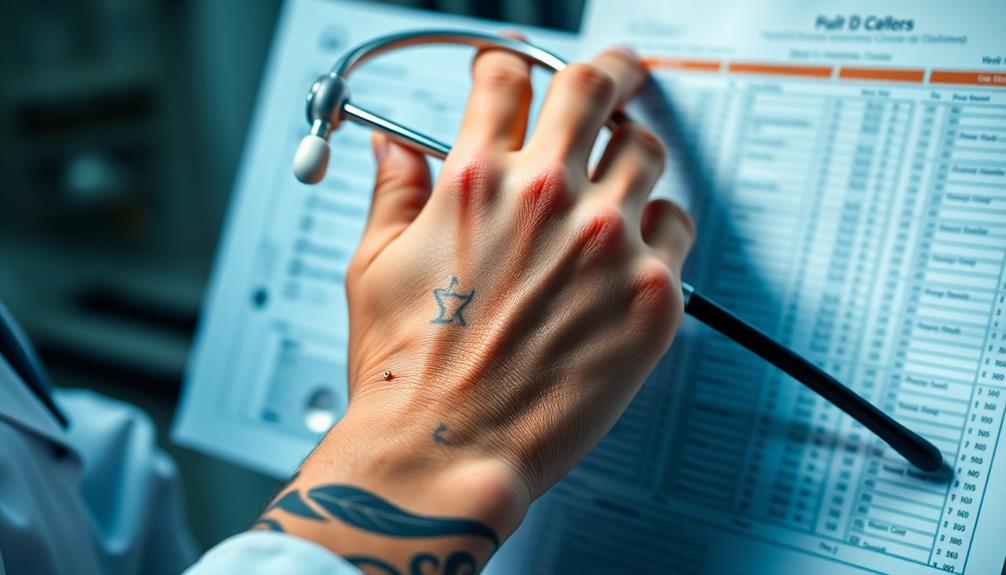
Visible body art in healthcare is gradually being reassessed, as recent research highlights a shift in attitudes toward piercings and tattoos among both patients and professionals. A study involving emergency doctors with temporary body art revealed no significant impact on patients' ratings of competence and professionalism. This suggests that body art may not adversely affect how patients perceive medical professionals.
In fact, many patients responded positively to doctors showcasing body art, indicating a growing acceptance of this expression among healthcare providers. This evolving perspective can be likened to how individuals with Borderline Personality Disorder (BPD) often face stigma based on their appearance and emotional expressions, demonstrating the need for greater understanding and acceptance in both contexts.
Demographics in emergency departments often include patients with tattoos and piercings, which likely shapes their perceptions of nurses and doctors with similar body art. Research also shows a notable divide between hypothetical survey responses about body art and actual patient experiences; real interactions often don't reflect the negative biases suggested in surveys.
Best Practices for Healthcare Professionals

Healthcare professionals must navigate the delicate balance between personal expression and maintaining a professional appearance, especially when it comes to piercings.
To guarantee you adhere to best practices, consider the following guidelines:
- Familiarize yourself with your Health network's specific policies on visible jewelry and piercings.
- Opt for minimal and discreet options, like small ear piercings or skin-colored studs.
- Assess the risks associated with your body art, particularly in high-contact environments.
By following these practices, you can express your individuality while guaranteeing patient comfort and safety.
Wearing small studs can help maintain a professional image while complying with infection control measures. If you have a septum piercing, consider using a flip-up option during work hours.
Understanding your patient demographics is also essential; being aware of their perceptions about body art can enhance trust and comfort.
Ultimately, it's about finding a middle ground that respects both your personal style and the professional standards of your workplace.
Frequently Asked Questions
Can Healthcare Workers Have Piercings?
Yes, healthcare workers can have piercings, but policies vary by institution. You'll need to check specific guidelines, as some places allow discreet jewelry while others may require you to remove visible piercings during work hours.
Is It OK for Doctors to Have Piercings?
In the tapestry of professionalism, doctors can adorn themselves with piercings, but it depends on the institution's threads. Check your workplace's fabric; some embrace personal expression, while others weave a more conservative design for patient trust.
What Piercings Are Acceptable in the Workplace?
In many workplaces, you'll find that small, discreet earrings are acceptable, while larger or visible piercings might not be allowed. Always check your specific workplace's guidelines to verify you're following their jewelry policies.
Can Professionals Have Piercings?
Studies show that 60% of patients perceive professionals with visible piercings as less competent. While you can have piercings, many workplaces expect a neutral appearance to maintain professionalism and avoid distracting patients during care.
Conclusion
In the world of healthcare, professionalism prevails, but personal expression can play a part too. While piercings might be permissible, they should be approached with prudence. Prioritize patient perceptions and workplace policies to maintain a polished appearance. Remember, it's all about balancing beauty and boundaries. By following best practices, you can navigate this nuanced landscape, ensuring your career thrives while staying true to yourself. So, stay savvy and stylish, but always keep safety and standards in sight!
Hi, my name is Danielle, and I’m an author for piercings-body.com. I have a passion for writing and love to share my knowledge on all things body piercing-related. I’m also a huge advocate for safe body modification practices and believe everyone should be able to make informed decisions about their bodies. When I’m not writing or blogging, I enjoy spending time with my family and friends, practicing yoga, and exploring new places.




